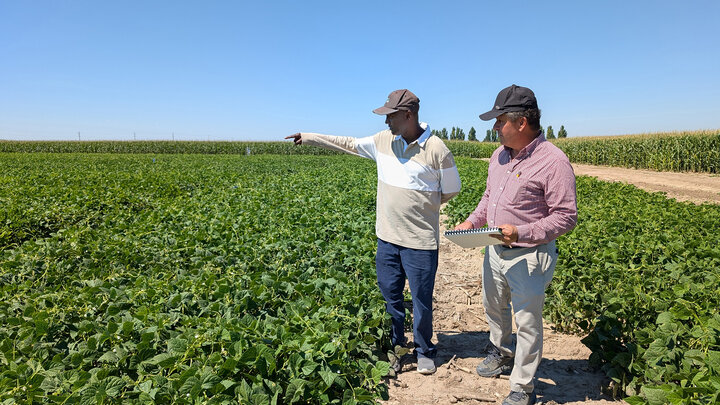Western Nebraska, unlike its eastern half, is very arid. The University of Nebraska-Lincoln (UNL) Panhandle Research Extension and Education Center (PREEC) in Scottsbluff is an ideal location for researching drought-tolerant crops, such as dry edible beans. While dry edible beans may not be a staple in many Western diets, it is a staple in East African cities like Burundi and Rwanda, where bean consumption per person is 120 to 140 pounds per year. The desire to produce a better bean for consumption and as a cash crop led to the dry bean breeding programs at UNL and the Alliance of Bioversity C/AT in Africa to collaborate.
“They gave us game-changing pinto beans, and we took it from there, and we tested in Tanzania, and we released it officially,” said Teshal Mamo, Alliance of Bioversity C/AT, dry bean breeder, in Arusha, Tanzania. The pinto bean is called “Kikatiti.”
“It is a variety with exceptional performance and was first identified by evaluation of the Durango Diversity Panel (DDP), which consisted of 200 accessions in on-station trials conducted in Arusha and Mbeya,” said UNL Bean Breeder Carlos Urrea at the Panhandle Research Extension and Education Center in Scottsbluff. Kikatiti took many years to develop, with the final cross being made in the greenhouse at the University of Nebraska during the winter of 2003. The initial single cross was made in 2002. “The variety was bulk tested in regional trials in Colorado, Idaho, Michigan, Nebraska, North Dakota, and Washington in 2007 and 2008, and in advanced yield trials in Scottsbluff and Mitchell, Nebraska.”
Kikatiti is especially adapted to low soil fertility, high temperatures, and drought. Mamo said two weeks ago he traveled to Nairobi, Kenya. “It is very dry, very low rainfall, and infertile soil, and Kikatiti performed well. A big farmer (in the area) he’s really happy with that, and the pinto type is replacing the old pinto variety (which had) very low yield and was susceptible to drought.” The dry bean also has disease resistance to common bacterial blight, angular spot, and matures quickly.
Before Kikatiti could become a cash crop in Africa, there was more collaboration with training, especially in breeding. Shida Nestory, a short-term scholar from Tanzania, joined Urrea’s breeding program in 2024 in Scottsbluff to study dry beans. He is a crop research officer at the Tanzania Agricultural Research Institute (TARI). “He is back in Tanzania and is a self-confident breeder, after his experience here (PREEC). He is sharing with other colleagues and has trained another team. His experience grew his thinking,” Mamo said.
Kikatiti will be grown in regional nurseries in 10 African countries CMit, where they will evaluate the bean in their environments this coming season, which starts in September or March, and in two to five years, see them growing in those countries. “This would be for more than 200 schools that have started eating beans during their lunch time. The (African) government really has a 10-year plan. To really cover the whole elementary and the junior school. Kids should eat beans, because beans have iron and zinc, which is good for really reducing anemia,” Mamo said.
The Nebraska Dry Bean Commission and the University of Nebraska-Lincoln donated the drought-tolerant dry bean, Kikatiti.
Mamo and Urrea are also part of the GEMINI Project, which stands for G, genotype, E, environment, M, management, IN, innovation, and I, intelligence.
They are part of a collaboration of universities in California, Puerto Rico, Uganda, Washington, and Senegal. The group is planting interspecific breeding lines under very dry and stressed heat environments. The beans will then be selected for regional nurseries. Focusing on small reds and dark purple and black, but in Africa, small red is preferred and is highly drought-tolerant. “We are going to check nutrition quality, iron and zinc, cooking time, important as using firewood and market acceptability. Farmer will produce more if consumer demand is high,” Mamo said.
The Gemini Project’s first phase will end this year, but Gates has made a promise for the next four years. Urrea and Mamo are making a joint project proposal for developing drought and heat-tolerant varieties.




